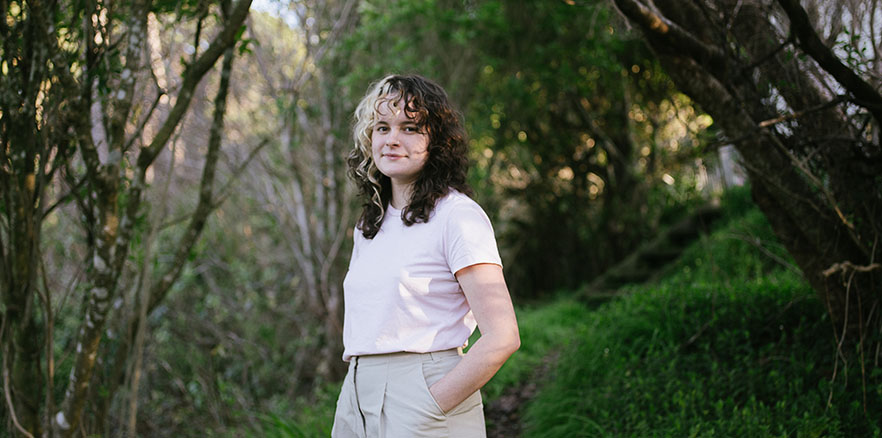
Dr Brodie Fraser. Photo: Tim Onnes
As a young campaigner on social justice and LGBTIQ+ rights, Dr Brodie Fraser has found working as a researcher in the Department of Public Health a perfect mix of their academic and activist interests. A Postdoctoral Research Fellow in the Department of Public Health at the University of Otago, Wellington, Fraser works in the He Kāinga Oranga Housing and Health Research Programme.
Their PhD research was the first to look at Takatāpui and LGBTIQ+ people's experiences of homelessness in Aotearoa New Zealand.
Their research found the community's experiences of homelessness to be diverse and multifaceted, highlighting the need for targeted support and the importance of focusing on addressing the structural, systemic causes of Takatāpui and LGBTIQ+ homelessness. Their postdoctoral research extends this work further to examine housing instability in these communities.
Fraser says they completed a PhD at Otago by chance, after a friend mentioned He Kāinga Oranga had a fully-funded scholarship available for research in the area.
“I ended up in the perfect place, with colleagues who are all pushing to create change.”
Fraser did a BA majoring in Political Science and minoring in Education, followed by a Master of Political Science at Te Herenga Waka – Victoria University of Wellington.
Being part of the community they are researching has both benefits and challenges, they say.
“There is always a lot of debate among academics on bringing your own personal experience to your work or considering yourself an activist.”
"...I do bring my personal experience and would consider myself to be an activist scholar. I think it does make me a really good academic and it is part of why I am able to do the work that I do and why I am so passionate about it."
Fraser talks openly in the media about their research findings that discrimination in the housing market is placing Takatāpui and LGBTIQ+ people at higher risk of homelessness, despite the potential for confronting feedback from the general public.
“There have definitely been times when I've had some odd emails land my way that aren't particularly nice, and that is a risk but, for me, my passion about the topic and desire to raise awareness of the issue generally outweighs that.”
Fraser grew up with a single mother in their early years, and neither of their parents were university-educated. Moving into academia has been a big challenge, they say.
“I am really lucky that I have such supportive colleagues, but there are still a lot of barriers for people with diverse backgrounds to get into academia.
“If universities do want to increase diversity, they need to increase the stipends paid to PhD students, especially if they want to support more Māori and Pacific students into postgraduate study.”
Fraser draws inspiration from the other researchers in the He Kāinga Oranga housing team, and was an acknowledged team member in the Rutherford Medal award the group received from the Royal Society Te Apārangi last year, an acknowledgement of the difference its work has made to housing and health.
“If I'm feeling a bit dejected, it's nice to zoom out a bit and see the wonderful change that has been achieved.”
Fraser names Associate Professor Nevil Pierse (deputy director of He Kāinga Oranga), who was one of their PhD supervisors, as a particular mentor.
“We have worked together a lot so I have really enjoyed going from being a student to being a colleague. I think that's been quite a fun process for both of us.
“I am really thankful that I am able to do the research that I do, and do it in the team that I'm in.”
Recent awards
- University of Otago Wellington Tuia Tangata Award for leadership in diversity, inclusion and participation (2021)
- University of Otago Division of Health Science Postdoctoral Research Fellowship (2021)
More stories about early career researchers
This story is part of the research publication 'He Kitenga 2022: Talented Futures', which presents the different pathways into research that early career researchers follow.